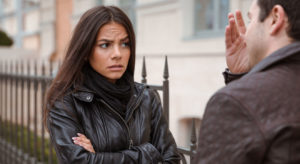I recently surveyed a group of my fellow therapists about their experiences of uncertainty leading up to their marriages. One hundred percent of the 22 respondents, who are all currently married, answered “yes” to experiencing feelings of ambivalence prior to their big day. I realize that this is a very small sample size, but it got me thinking about why feeling unsure about marriage is not more normalized in our society. It seems that we tend to misperceive feelings of uncertainty as a predictor of failure, rather than seeing trepidation as a natural reaction to making any major life decision.
There seems to be a social expectation that from the moment we get engaged, ‘til we walk down the aisle, we are supposed to be filled with absolute confidence in and constant excitement about what lies ahead. We are made to feel that the presence of hesitancy is an indication that something is very wrong. When I Googled “ambivalence about marriage” all I could find were articles about how “doubt means don’t” and how you should pack your bags if you are having questions about your nuptials. Yet, all of the happily married people I polled reported that they felt uncertain before their weddings. So is being unsure necessarily a bad sign? Instead of assuming it is, shouldn’t we try to understand where on the uncertainty spectrum we fall: conscientiously ambivalent or riddled with doubt?
Over the past year of being engaged to a man whom I love very deeply, I’ve experienced uncertainty numerous times. I’ve also felt tremendous shame about admitting it to anyone. I feared it would be a scarlet letter on my future, and I was terrified that people would judge me. I’ve seen enough romantic comedies to know that “once you find the one, you’ll be sure.” So I kept it to myself. I suffered alone, convinced that something was wrong with me. When I finally shared my concerns with my therapist she reassured me that this was something that everyone experienced. I felt relief, but I still felt alone. Even if it was something everyone felt, it wasn’t something everyone was talking about.
But the truth of the matter is that you should be feeling ambivalence before your wedding day. Why? Because this is a huge decision, perhaps one of the largest and most important you’ll ever make in your life. The presence of ambivalence shows that you fully grasp the momentousness of this change in your life. Additionally, given the current divorce rate and the pain and suffering that results from that process, you’d be naive not to think twice about this.
Susan Pease Gadoua, licensed therapist and author of the book The New I Do: Reshaping Marriage for Skeptics, Realists and Rebels, sheds further light on how normal the experience of uncertainty is before marriage. She explains that:
Any time we make a major decision in life whether it’s to take a new job, buy a new house, get married (or divorced) or have a child, there’s ambivalence. And there should be! Every choice we make in life entails trade-offs. It’s healthy to value the aspects of your life that you like and be afraid to make this big of a change. Wondering whether it’s the right thing to do, with the right person, at the right time doesn’t mean that you’re marrying the wrong person. That is part of the romantic myth that there is ‘The One.’
In fact, she elaborates, your ambivalence may ultimately be a useful tool because there are never any guarantees in life but the more real you are going into marriage about what you and your spouse-to-be are bringing to the marital table, the more solid of a foundation you can build beneath you for when life gets more complicated, as it invariably will.
Now, I’m not arguing that you should ignore your feelings and still head towards the altar if you have a nagging sense that this just isn’t right. I’m simply saying that the presence of uncertainty, is not in and of itself, a reason to walk away.
Instead you should investigate the feelings and try to understand what underlies them. Is there a genuine concern about compatibility, safety or shared values? Do you share a similar vision for the future? Is it possible that you are getting married for the wrong reason (I.e. “all my friends are doing it,” “I was afraid no one better would come along,” “to make my family happy,” “I’m too ashamed to call it off”)? Are the roots of your ambivalence things that seem understandable and manageable?
Next, speak up! Talk to your partner, talk to you friends, talk to other brides and grooms, talk to your therapist. Don’t force yourself to be alone with these feelings. The more we feel alone, the more likely we are to pathologize our feelings, rather than see them as expectable. If you can name the feelings, then at least you can process them and get support.
As I prepare to walk down the aisle with the love of my life in just over a month, I still have feelings of uncertainty from time to time. But those feelings have lead to really productive conversations with my partner that have only served to strengthen our relationship. In fact, we’ve likely tackled some of the problems that would have inevitably come up in our marriage, beforehand. So in a way, my ambivalence, when put openly on the table, has ultimately served to strengthen my belief in the commitment we are making.
I cannot predict what will happen in the future. Nothing is 100 percent certain. But I no longer feel that my ambivalence is a predictor of the ultimate success or failure of my marriage, nor is it something to be ashamed of. Even though it’s scary to admit these feelings publicly, I want to help normalize, rather than stigmatize, what I now understand be an expectable step on the road to a decision of great magnitude (and great joy!).


